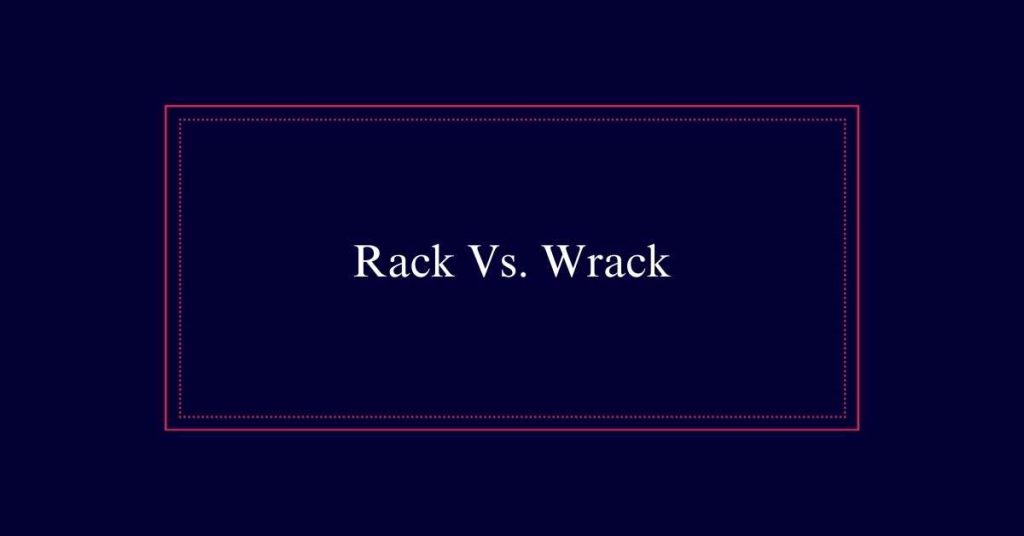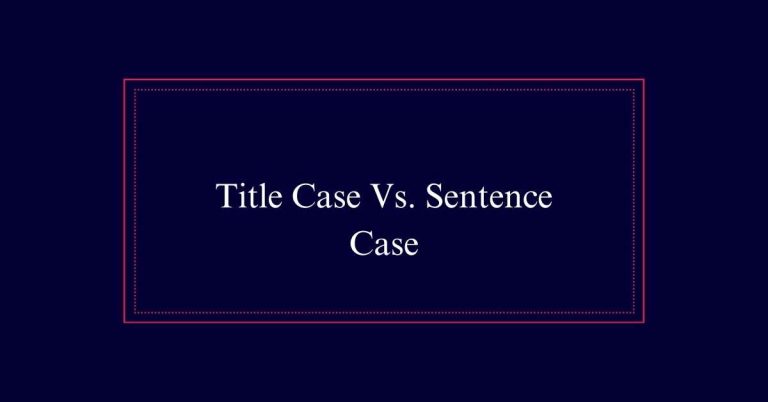Rack Vs. Wrack
‘Rack’ and ‘wrack’ have different meanings. ‘Rack’ generally refers to a framework for holding items, such as a wine rack or coat rack. It can also mean to torture or to gather something. ‘Wrack’ pertains to the remains of something destroyed, like ship wreckage or seaweed on the shore. As verbs, ‘wrack’ implies causing ruin, while ‘rack’ can mean placing items on a rack or inflicting pain. Both are used in the term ‘nerve-racking’ or ‘nerve-wracking,’ though ‘nerve-racking’ is more common.
Understanding ‘Rack’ as a Noun
A ‘rack’ as a noun can refer to a framework designed for storing or displaying items. This common usage encompasses various structures, such as a wine rack for bottles or a coat rack for garments.
Beyond this, ‘rack’ denotes a specific cut of meat, including a rack of lamb. It can also reference a bar or rail used for adjusting positions, as seen in adjustable shelving units.
Historically, a ‘rack’ was an instrument of torture, stretching limbs to induce pain.
Different ‘Rack’ Verbs
While ‘rack’ serves various noun functions, it also operates as a verb with distinct meanings. As a verb, ‘rack’ can describe placing items on a rack for display or storage. It can also mean to torture someone, drawing from historical contexts where torture devices were called racks. Additionally, ‘rack’ can signify the process of gathering or accumulating something, often used in contexts like racking up points or debts.
| Verb Form | Meaning | Example Usage |
|---|---|---|
| Display | Place items on a rack | “She racked the clothes.” |
| Torture | Inflict severe pain | “He was racked with guilt.” |
| Accumulate | Gather something | “They racked up the score.” |
‘Wrack’ as a Noun
Understanding ‘wrack’ as a noun involves examining its meanings related to destruction and wreckage.
Primarily, ‘wrack’ refers to the remains of something that has been destroyed, like the wreckage of a ship. This term vividly captures the aftermath of calamity.
Additionally, ‘wrack’ can denote the leftovers or debris resulting from ruin, serving as a visual reminder of devastation.

Outside of destruction, ‘wrack’ also describes seaweed or kelp found along shores. This usage highlights its ecological context, diverging from its more catastrophic meanings.
Verbal Uses of ‘Wrack’
In addition to its noun form, ‘wrack’ also functions as a verb, meaning to cause ruin or destruction. This usage is less common but still significant.
For instance, one might say, ‘The storm will wrack the coastline,’ indicating severe damage. This verb form can also imply intense emotional or physical suffering.
For example, ‘She was wracked with guilt,’ suggests overwhelming distress. The term ‘wrack’ as a verb closely mirrors ‘wreck’ in both meaning and usage.
Nerve-Racking Vs. Nerve-Wracking
The expressions ‘nerve-racking’ and ‘nerve-wracking’ are often used interchangeably, but they have distinct origins and nuances. ‘Nerve-racking’ comes from the word ‘rack,’ which historically means to cause stress or emotional strain, much like the torture device.
‘Nerve-wracking’ stems from ‘wrack,’ meaning to ruin or destroy. Both terms convey the idea of extreme stress or anxiety, but ‘nerve-racking’ is more commonly accepted and used.
Despite their different roots, modern usage treats them as variants, and many dictionaries list both as correct. However, for formal writing, ‘nerve-racking’ is generally preferred.
Common Phrases With ‘Rack’
Exploring common phrases with ‘rack’ reveals its versatile usage in everyday language. For example, the phrase ‘rack one’s brain’ means to think very hard or make a great effort to remember something.
‘Rack up’ is often used in contexts like scoring points in a game or accumulating debts.
‘On the rack’ describes a state of intense stress or anxiety, drawing from the historical torture device.
In sports, ‘hit the rack’ means to go to sleep, especially for athletes recovering after a strenuous activity.
Each phrase showcases how ‘rack’ can convey different nuances depending on context, enhancing its adaptability in communication.
Phrases Involving ‘Wrack’
Phrases involving ‘wrack’ often emphasize destruction, ruin, or extreme distress. Common expressions like “wrack and ruin” underscore complete devastation. Another phrase, “nerve-wracking,” highlights extreme anxiety or stress. “Wracked with pain” conveys intense suffering. These phrases often evoke strong imagery of physical or emotional collapse.
| Phrase | Meaning | Example Usage |
|---|---|---|
| Wrack and ruin | Complete destruction | “The house was in wrack and ruin.” |
| Nerve-wracking | Extremely stressful | “The exam was nerve-wracking.” |
| Wracked with pain | Suffering intense pain | “He was wracked with pain after the injury.” |
| Wrack havoc | Cause destruction or chaos | “The storm wracked havoc on the coast.” |
Practical Usage Examples
Understanding the practical usage of ‘rack’ and ‘wrack’ can clarify their interchangeable nature in various contexts. For instance, ‘nerve-racking’ and ‘nerve-wracking’ both describe something that induces stress or anxiety.
Similarly, ‘rack my brain’ means to think hard about something, whereas ‘wrack with guilt’ means being overwhelmed by guilt.
The phrase ‘rack and ruin’ is often used to describe something that has decayed, while ‘wrack and ruin’ can also be found in literature to convey complete destruction.






